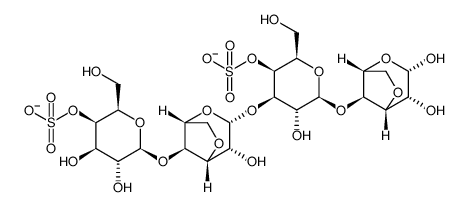11114-20-8
| Name | κ-carrageenan |
|---|
| Description | κ-Carrageenan is a natural polymer which predominantly available in red seaweeds. κ-Carrageenan is an effective drug carrier to deliver curcumin in cancer cells and to induce apoptosis. κ-carrageenan serves as a potential inflammatory agent that magnifies existing intestinal inflammation[1][2]. |
|---|---|
| Related Catalog | |
| In Vitro | κ-Car- Curcumin (Cur) (0-500 μg/mL; 24-72 hours) effectively involves in cancer cell growth inhibition at lower concentrations of 40 µg/mL[1]. The cytotoxicity of the Cur loaded κ-Car has a significantly high apoptotic activity in selected lung cancer cells of A549[1]. κ-Carrageenan (1-60 μg/mL; 0.5-24 hours) enhances LPS-induced IL-8 secretion in HT-29 cells[2]. Cell Viability Assay[1] Cell Line: A549 cells Concentration: 0-500 μg/mL Incubation Time: 24, 48 and 72 hours Result: The dose response effects of cells treated with Cur loaded κ-Car after incubation of 24, 48 and 72 h exhibited a significant IC50 values of 65, 50 and 40 μg/mL respectively, for 24, 48, 72 h ours. |
| In Vivo | κ-Carrageenan (1.7-41.7 mg/kg; p.o. for 1 week prior to C. freundii DBS100 treatment) can synergistically activate LPS-induced inflammatory through the Bcl10-NF-κB pathway, as indicated by its aggravation of C. freundii DBS100-induced colitis in mice[2]. κ-Carrageenan enhances the C. freundii DBS100-dependent induction of TLR4 and NF-κB in the intestinal mucosa of infected mice[2]. κ-Carrageenan aggravated the TNBS-induced intestinal inflammation, and such an effect could be associated with the oxidative stress and activation of TLR4-NF-κB and MAPK/ERK1/2 pathway[3] Animal Model: Male and female NIH (s) mice[2] Dosage: 1.7 mg/kg, LOW; 8.3 mg/kg, MED; or 41.7 mg/kg, HIG Administration: Orally administered for 1 week prior to C. freundii DBS100 treatment Result: Enhanced the C. freundii DBS100-dependent induction of TLR4 and NF-κB in the intestinal mucosa of infected mice. |
| References |
| Molecular Formula | C24H36O25S2-- |
|---|---|
| Molecular Weight | 788.65800 |
| Exact Mass | 788.09900 |
| PSA | 394.53000 |
| Appearance | Solid | White to almost white to yellow to brownish |
| Water Solubility | H2O: 5 mg/mL hot, soluble |
| Hazard Codes | F+ |
|---|---|
| RIDADR | NONH for all modes of transport |
| WGK Germany | 2 |
| RTECS | FI0704000 |


